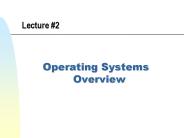Operating Systems - PowerPoint PPT Presentation
Title:
Operating Systems
Description:
Operating Systems Review – PowerPoint PPT presentation
Number of Views:32
Avg rating:3.0/5.0
Title: Operating Systems
1
Operating Systems
- Review
2
Questions
- What are two functions of an OS?
- What layer is above the OS?
- What layer is below the OS?
3
Questions
- What causes OS to change?
- Or, why arent we still running MS-DOS?
- What is a process?
- What is a file?
4
True or False
- Unix is a simple structure OS
- Micro Kernels are faster than other OSes
- Virtual Machines are faster than other OSes
5
Questions
- Name 3 operating system structures
- Give one advantage of each
- Give one disadvantage of each
6
Questions
- How does a shell work? Or arrange the commands
in order - wait()
- pid fork()
- exec()
- gets()
- while(1)
7
Review
- What is a PCB?
- Usually the PCB is in OS memory only. Assume we
put the PCB into a processes address space. What
problems might this cause?
8
Review
- List steps that occur during interrupt
- True or False
- Context switch times happen every 5-10 seconds
- Most processes have long CPU burst times
9
Review
- What is (average) waiting time?
- Explain how SJF works
- True or False
- FCFS is optimal in terms of avg waiting time
- Most processes are CPU bound
- The shorter the time quantum, the better
10
Questions
- How does Windows NT/2000 avoid process
starvation?
11
Review
- What is a race condition?
- What are 3 properties necessary for a correct
critical region solution? - What is Petersons Solution?
12
Possible Outputs?
- int main()
- int num, shm_id
- shm_id shmget(502)
- num (int ) shmat(shm_id)
- fork()
- num num 1
- printf("d\n", num)
(Assume shm is 0 when first Created)
13
Possible Outputs?
- int num 0
- int main()
- fork()
- num num 1
- printf("d\n", num)
- What if fork() was spawn()?
14
Review
- What does Test_and_Set do?
- What is one major advantage of semaphores over
the Test_and_Set or Petersons solution?
15
Review
- What is the Memory Management Unit?
- What is a relocation register?
- What happens to it during a context switch?
16
Review
- What are some of the sections in an object
module? - What are some of the steps that occur during
linking?
17
Review
- What is internal fragmentation?
- What is external fragmentation?
- What is compaction?
18
True or False
- With paging, logical address spaces are
contiguous - With paging, physical address spaces are
contiguous - Paging reduces the size of the possible address
space used by a process
19
Review
- Does paging have fragmentation?
- No? Then why not?
- Yes? Then what kind?
- What are the overheads associated with paging?
20
Review
- What is run-time, dynamic linking?
21
Review
- True or False
- The logical address space cannot be bigger than
the physical address space - Processes have big address spaces because they
always need them - Demand paging
- Is unrelated to basic paging
- Brings logical pages into physical memory when
requested by a process - Increases memory requirements for a system
- All of the above
- None of the above
22
Review
- Page faults
- What is a page fault?
- What does an OS do during a page fault?
- What is a Page Replacement Algorithm?
- What is Beladys Anomaly?
- How does the Optimal algorithm work?
- How does Enhanced Second Chance work?
- What is thrashing?
- How do we fix it?
23
Review
- What is a file descriptor?
- What information must it contain?
- What information might it contain?
24
Linked-List with Index
- How many files are there?
- How large are they?
- How many free blocks are there?
25
I-Node
i-node
- How many data blocks are there?
- If you added 3 more data blocks to the file, what
would happen?
62
77
Disk blocks
null
null
null
null
null
26
Review
- Directories
- In what way is a directory different than a file?
- In what way is a directory similar to a file?
- Aliases
- Describe a hard-link
- Describe a soft-link
- Free space management
- What are two common methods of keeping track of
free blocks?
27
Flo00
- What is journaling? How is it used in modern
file systems? - How do large disks cause problems for some file
systems? How are those problems addressed in
modern file systems?
28
SCG00
- What are three classes of applications handled by
typical OSes? - What components does QLinux provide?
29
SCG00
- What are the two classes used in this test?
- Draw conclusions from the graph































